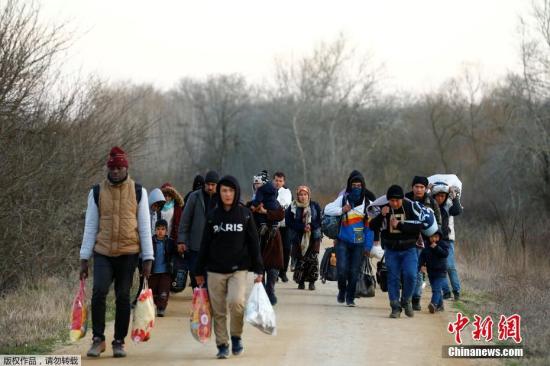China News Service, October 3 According to Euronet, the European Union News Agency reported that EU leaders will hold a summit from October 1 to 2 to discuss issues such as the situation in the Eastern Mediterranean.
However, on the first day of the summit, Greece and Cyprus clearly rejected the relevant provisions of the summit’s resolution on the Eastern Mediterranean issue, saying that the text did not explicitly mention Turkey’s role in regional conflicts and specific sanctions.
On March 1, 2020 local time, refugees are heading to the Turkish-Greek border.
The Turkish government announced on February 27 that it would no longer prevent refugees from entering Europe.
According to the report, in the first bill rejected by Greece and Cyprus, although it reiterated the EU’s commitment to ensure the sovereignty of Greece and Cyprus in the face of threats, and called on Turkey to stop any activities in the relevant waters, it did not explicitly mention it. And what sanctions measures may be launched against Turkey.
Greek government spokesperson Petsas said in an interview that the Eastern Mediterranean bill did not balance the parties and was therefore "unacceptable."
He said that the authorities' request for the draft bill is that in the face of Turkey's "provocation", the EU's actual solidarity with Greece and Cyprus should be clarified.
Greek Prime Minister Mizotakis said that the EU faces two possible choices. "One choice is dialogue and diplomacy, and dialogue must be based on respect for international law, avoiding unilateral actions and good-neighborly relations; the other is Escalating tensions will inevitably force the EU to take measures against Turkey."
According to the report analysis, as the core country of the European Union, German Chancellor Merkel hopes to adopt a more moderate attitude on the Turkish issue and avoid imposing sanctions.
She believes that the EU needs "to develop a truly constructive relationship with Turkey, despite the difficulties"; while French President Macron supports the demands of Greece and Cyprus to impose sanctions on Turkey.
Due to Greece’s opposition, the summit’s agenda could not continue, so European Council President Michel, European Commission President Von der Lein, German Chancellor Merkel, French President Macron, Greek Prime Minister Mizotakis, and Cyprus President Anas Tarshas, held a special meeting to discuss the revision of the draft text.
According to reports, all parties finally agreed that the EU will review Turkey’s performance in December, and sanctions will be imposed if Turkey’s "provocative behavior" is not stopped.
Mizotakis said on the second day of the summit that he was satisfied with the results achieved at the summit.
Because the EU has sent a message of solidarity and solidarity, and has stated with absolute certainty that stopping any unilateral actions is a prerequisite for improving EU-Turkish relations, "this is what we all want to see."
In addition, before the summit, NATO Secretary-General Stoltenberg announced that Greece and Turkey have established mechanisms to avoid accidental conflicts in the Eastern Mediterranean.
Stoltenberg said that a telephone hotline will be established between the two countries to avoid conflicts at sea or in the air.
(Liang Manyu)

